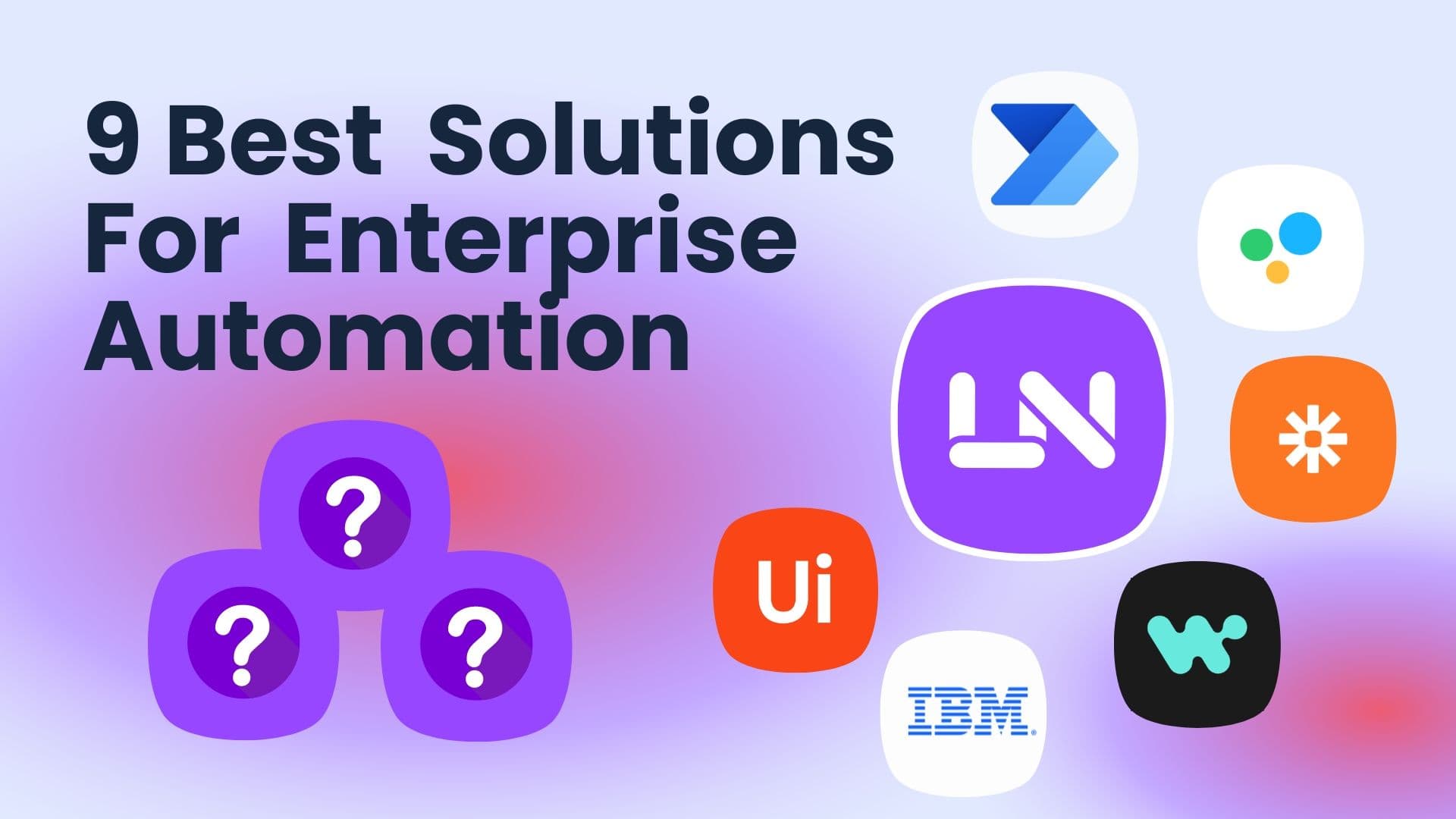What is Enterprise Automation?
Maximizing Efficiency with Enterprise Automation: Tips and Tricks

Introduction:
What's up, everyone? It's Radzivon from Latenode, and today I want to talk to you about an incredibly important topic - enterprise automation.
Enterprise automation has emerged as a strategic imperative for companies seeking to thrive in the digital age. By implementing comprehensive software systems and automated processes, organizations can optimize operations, enhance efficiency, and drive innovation across all aspects of their business. This article explores the key concepts, benefits, and future trends of enterprise automation.
Key Takeaways: Enterprise automation is a crucial aspect of digital transformation that enables organizations to optimize operations, drive innovation, and remain competitive in rapidly evolving markets. By leveraging advanced software systems, automated processes, and cutting-edge technologies like AI, ML, and IIoT, companies can streamline workflows, enhance efficiency, and improve customer service quality. Successful implementation of enterprise automation requires careful planning, change management, and collaboration with experienced partners, such as Latenode, to align automation initiatives with business goals and ensure a seamless integration.
Try to Enterprise Automation on Latenode – the best automation platform for you
What is Enterprise Automation?
Enterprise automation involves the use of advanced software systems and automated processes to manage and optimize various operational aspects, including production, logistics, retail, administration, and management tasks. The primary goals of enterprise automation include:
- Monitoring and controlling every stage of the production cycle to ensure high-quality output.
- Remote tracking of all processes, allowing managers and specialists to oversee operations from any location.
- Creating flexible system configurations tailored to the unique needs of specific businesses.
- Automating financial accounting, trade operations, reporting, and customer management.
- Accelerating workflows and enhancing operational efficiency.
- Standardizing processes to prevent errors and disruptions.
- Improving customer service quality.
- Reducing costs by increasing labor productivity.
Key Objectives of Enterprise Automation
The primary objectives of implementing enterprise automation are to streamline operations, enable business scalability, and create conditions for growth and development. By automating routine and repetitive tasks, employees are freed from mundane activities, allowing them to focus on higher-value, strategic initiatives. Management can also reduce the need for intensive employee oversight, as automated systems ensure consistent and reliable execution of processes. Key goals of automated enterprise:
- Effective organization of accounting and control processes.
- Enhancing the technological sophistication of the business to remain competitive.
- Improving customer service quality.
- Achieving financial savings through increased productivity and reduced operational costs.
- Standardizing workflows to minimize errors and inconsistencies.
Benefits of Enterprise Automation
Enterprise automation systems offer numerous advantages that can significantly improve an organization's operations. One of the key benefits is the ability to customize the system to meet the unique requirements of a specific business, which ensures:
- Effective control and monitoring of all processes.
- Quick response to any changes and optimization of workflows.
Automation enables faster operations, contributing to the acceleration of all business processes and enterprise workflow automation. Another important aspect is the provision of:
- Data security and protection, minimizing the risks of data breaches and cyberattacks.
- Error reduction through the standardization and automation of processes.
Automation enterprise systems are not limited by the number of users, making them convenient for large enterprises with numerous employees. The ability to perform parallel tasks significantly increases work efficiency. Intuitive user interfaces make working with automation systems simple and accessible for all users, regardless of their level of technical expertise.
Thus, automated enterprise is a powerful tool for enhancing operational efficiency, improving customer service quality, and reducing costs, making it an essential part of modern business.
Simplify and Streamline Your Enterprise Automation with Latenode
![]()
Are you looking to achieve these goals but don't know where to start? Latenode, the intuitive low-code platform, empowers organizations to quickly and efficiently automate their operations without extensive programming knowledge. With Latenode, you can easily create and optimize complex workflows, integrate with existing systems, ensure data security, scalability or any scenario you can think of.
Key Features of Latenode:
- Visual Workflow Designer: Latenode's drag-and-drop interface allows users to create and modify complex workflows with ease, reducing the need for coding expertise.
- Extensive Integration Options: The platform supports integration with numerous popular services and applications, such as Google Sheets, Slack, Trello, and Salesforce. This makes it easy to connect different parts of your business into a cohesive system.
- Rapid Application Development: With Latenode's pre-built templates and reusable components, users can quickly develop custom applications tailored to their specific business needs.
- Collaborative Environment: The platform fosters collaboration among teams, allowing multiple users to work on the same projects simultaneously and facilitating seamless communication and knowledge sharing.
- Code AI Assistant: Latenode's Code AI Assistant blurs the line between no-code and low-code by allowing users to generate code snippets or entire scripts simply by describing their requirements in natural language.
![]()
Now you can see an example of automation enterprise with Latenode. And to elaborate, Automating the process of receiving customer requests via email, extracting the necessary information, processing it and updating the CRM system while notifying the relevant team members.
And this is how the result of this automation looks visually:
![]()
Try to Create your own Automation on Latenode – Your automation platform for you
If you need help or advice on how to create your own script or if you want to replicate this one, contact our Discord community, where the Low-code automation experts are located.
Types of Enterprise Automation:
There are several types of automation, each with its unique features and applied based on the goals and tasks of the enterprise. Here are the main types of enterprise automation:
- Full Automation: All processes are completely automated, with human workers only monitoring operations.
- Comprehensive Automation: Core processes are automated and centrally controlled across locations.
- Partial Automation: Specific processes or production areas are automated.
Key Components of Enterprise Automation Systems:
Enterprise automation is the implementation of technologies to automate tasks and processes, enabling increased efficiency, reduced costs, and improved product quality. Enterprise process automation systems typically consist of various integrated components that work together to streamline operations. Here are some key components:
- Enterprise Resource Planning (ERP): Handles resource planning and management of key business processes.
- Manufacturing Execution System (MES): Controls and monitors actual production processes in real-time.
- Product Lifecycle Management (PLM): Manages the entire lifecycle of products from conception to disposal.
- Supply Chain Management (SCM): Optimizes the flow of goods, services, and information among supply chain participants.
- Customer Relationship Management (CRM): Consolidates customer data and automates marketing, sales, and service processes.
- Business Intelligence (BI): Analyzes data to extract actionable insights that drive strategic decision-making.
Implementing Enterprise Automation:
The implementation process typically involves assessing current equipment and operational state, diagnosing technical capabilities, studying best practices and innovations, defining a development roadmap, and deploying automation solutions. While automated enterprise drives productivity gains, it can also lead to workforce reductions due to technological unemployment. However, it enables attracting investments, entering new markets, improving product quality/safety, and driving innovation.
Future of Enterprise Automation:
As someone deeply involved in the field, I believe that the future of enterprise process automation will be greatly shaped by the adoption of cutting-edge technologies such as the Industrial Internet of Things (IIoT), artificial intelligence (AI), machine learning (ML), big data analytics, cloud computing, and cybersecurity. These innovations will empower organizations to achieve unprecedented levels of efficiency, flexibility, and competitiveness by streamlining operations, anticipating and mitigating issues, and making intelligent decisions in real-time.
The exponential growth of data generated by automated systems will necessitate the use of advanced analytics tools and techniques to extract valuable insights and inform strategic decision-making. Cloud computing will provide a scalable, flexible, and cost-effective platform for hosting and integrating automated systems, while robust cybersecurity measures will be paramount in safeguarding sensitive data and ensuring business continuity. To fully capitalize on the potential of these technological advancements, organizations must cultivate a culture of continuous learning, adaptability, and innovation, investing in the development of a skilled and agile workforce capable of driving the future of enterprise automation.
Conclusion:
Enterprise automation is a powerful enabler of digital transformation, allowing companies to optimize operations, drive innovation, and remain agile in rapidly evolving markets. By embracing advanced technologies, such as Latenode's low-code automation platform, and investing in human capital development, organizations can unlock the full potential of automation and secure their competitive advantage. Successful enterprise automation requires careful planning, change management, and robust IT capabilities to navigate the challenges of integration, data quality, scalability, and cultural resistance. Partnering with experienced system integrators, consultants, and leveraging the capabilities of platforms like Latenode can provide the necessary expertise and guidance to align automation initiatives with overarching business goals and ensure a successful implementation.
Try to Enterprise Automation on Latenode – the best automation platform for you



